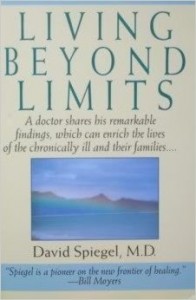“I wish I had known about this group when I was first diagnosed”
The Group
This Group is open to women in throughout Queensland, Australia, who have the diagnosis of advanced, also known as metastatic or secondary, breast cancer. It is delivered both face-to-face and via the telephone.
The Group is a supportive/expressive group, modelled on t he work of Dr David Spiegel (Stanford University), author of “Living Beyond Limits: New help and hope for facing life threatening illness.”
he work of Dr David Spiegel (Stanford University), author of “Living Beyond Limits: New help and hope for facing life threatening illness.”
Evidence suggests that the diagnosis of metastatic breast cancer results in high levels of psychological morbidity, including depression, anxiety and traumatic stress responses. While supportive-expressive groups have been effective in significantly reducing these symptoms in controlled studies, (see abstract below), less is known regarding how these results translate in community based group interventions -particularly when an innovative model of delivery (face to face and telephone) is used.
When joining the group women are asked to consent to filling in a series of self-assessment questionnaires. These include the Affects Balance Scale, the Impact of Events Scale, and the Profile of Mood States, (since 2001). In 2005 four other questionnaires, which measure a broader range of social impact and functioning, were introduced. All of these are used in similar studies.
The results for this group show that compared to a normative sample,participants prior to group membership were found to have low levels of vigour and high levels of depression. After 12 months of group membership positive affect (except vigour) had significantly increased, while negative affect (depression, anxiety, guilt and hostility) had significantly decreased. Further, levels of intrusive and avoidant symptoms had significantly decreased.These findings suggest that a supportive-expressive group intervention,delivered in an innovative way within a community setting, is an effective means of moderating the adverse effects of diagnosis of metastatic breast cancer.
Supportive Expressive Group Therapy for Women with Metastatic Breast Cancer: Improving Access for Australian Women Through Use of Teleconference.
Mary O’Brien, Jill Harris, Robert King, Tom O’Brien.
Abstract
While supportive-expressive group therapy (SEGT) has been found to be effective in significantly reducing distress associated with life-threatening illness, the challenge in Australia is to develop a means of providing supportive interventions to rural women who may be isolated both by the experience of illness and by geographical location. In this study an adaptation of SEGT was provided to women with metastatic breast cancer who attended face-to-face or by telephone conference call.
Participants showed significant gains on standardised measures of well-being, including a reduction in negative affect and an increase in positive affect, over a 12-month period. A reduction in intrusive and avoidant stress symptoms was also observed over 12 months; however, this difference was not significant. These outcomes suggest that SEGT, delivered in an innovative way within a community setting, may be an effective means of moderating the adverse effects of a diagnosis of metastatic breast cancer while improving access to supportive care for rural women.These results are considered exploratory,as the study did not include a matched control group. Download article Supportive-expressive group therapy for women with metastatic-breast cancer- improving access for australian women through use of teleconference
To refer, please contact us: [email protected] or on 07 3217 2998
Mouth Wash
If you have mouth ulcers try a mouthwash of baking soda in warm water.

